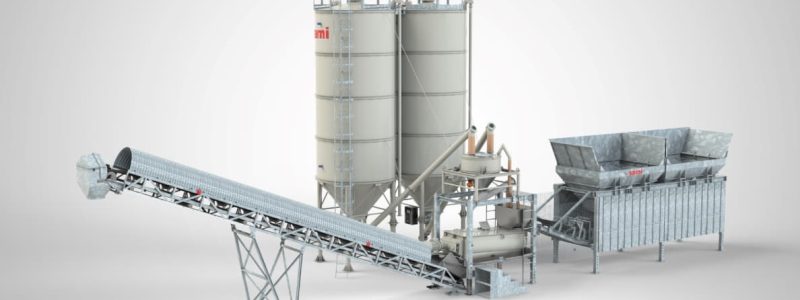If you’ve ever been curious about construction sites and the machinery used, you’ve likely come across concrete batching plants. These plants play an integral role in every construction project, providing the backbone for buildings, roads, bridges, and more.
Let’s delve into the world of concrete mixing plants, understand their operation, and discover their importance.
Concrete Batching Plants
A concrete batching plant is a machine that manufactures concrete from its ingredients viz cement, crushed stone, water, and sand. This operation is executed with precision and speed to ensure the resulting product, concrete, is of the highest quality. The mixing plant mixes these ingredients in the right proportions to create the perfect blend.
How Does A Concrete Batching Plant Work
The concrete mixing plant operates in a series of straightforward steps. First, the raw materials are loaded into their respective compartments. These compartments, or bins, store the cement, aggregates like sand and gravel, and water.
Mixing Process
The mixing process begins when the control system signals the aggregates to be released into the mixer. The aggregates are weighed before they’re dumped into the mixer to maintain the correct proportion. Subsequently, cement and water are added, and the mixing process begins.
Quality Control
Quality control is of utmost importance in a concrete mixing plant. The plant has built-in systems that monitor the quality of the mix. For instance, moisture sensors in the sand and aggregate bins can adjust the amount of water added to the mix, ensuring consistency. This precise mix gives the final concrete product its strength and durability.
Types of Concrete Batching Plants
There are primarily two types of concrete mixing plants: stationary and mobile.
Stationary Plants
These plants are large and permanent installations that produce high volumes of concrete. These plants are ideal for big projects that require a steady supply of concrete over a long period. They often feature sophisticated automation systems, allowing for minimal human intervention in the production process.
Mobile Plants
On the other hand, these plants are portable and can be moved from one site to another. These are perfect for smaller projects or those that require frequent site changes. Despite their smaller size, mobile plants don’t compromise on the quality of the concrete produced.
The Role of Concrete Batching Plants in Construction
Concrete mixing plants play a pivotal role in construction projects. They allow for the mass production of concrete in a controlled environment, ensuring each batch is consistent in quality and strength. This consistency is crucial as it affects the integrity of the structure being built.
Furthermore, having a concrete batching plant on-site or nearby reduces transportation costs and risks associated with moving wet concrete. It also allows for a continuous supply of fresh concrete, which can be crucial during large construction projects.
Conclusion
In essence, a concrete batching plant is more than just a construction machine; it’s an indispensable part of any building project. Whether you’re erecting a skyscraper or paving a new road, the concrete produced by these plants is the foundation of your work.
As we’ve seen, these plants bring a level of precision, efficiency, and quality control that’s unmatched in the construction industry. So, the next time you pass by a construction site, you’ll know this plant’s critical role in shaping our built environment.

